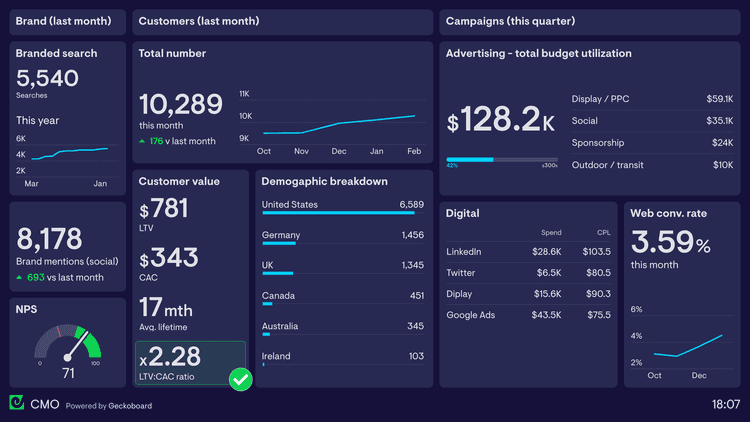Unleash the Power of Your Marketing Data
Transforming Marketing Insights into Strategic Actions for Unmatched Campaign Success
Enhance Marketing Performance: Gain real-time insights into marketing activities and effectiveness.
Optimize Campaign Strategies: Streamline marketing processes and maximize ROI.
Predict Consumer Behavior: Utilize predictive analytics to anticipate and respond to market trends.
What is Marketing Data Analytics?
10 KPIs of A Marketing Analytics
How is Analytics Used in Marketing?
Improved Marketing Performance
Improved marketing performance involves using data analytics to gain real-time insights into marketing activities and their effectiveness. Analytics helps track key metrics, evaluate marketing tactics, and identify opportunities for improvement.
Example: Implementing a marketing dashboard to monitor KPIs such as ROMI and CTR, leading to more effective marketing strategies and budget allocation.
Benefit: Enhanced visibility into marketing performance enables faster decision-making and improves the effectiveness of marketing efforts.
Optimized Campaign Strategies
Optimizing campaign strategies means using data analytics to streamline marketing processes and maximize ROI. Analytics helps identify market trends, segment customers, and tailor campaigns accordingly.
Example: Using customer segmentation to develop personalized email campaigns that resonate with specific audience segments, resulting in higher engagement and conversion rates.
Benefit: Better campaign strategies increase ROI, improve customer targeting, and enhance overall marketing performance.
Consumer Behavior Prediction
Consumer behavior prediction involves using analytics to anticipate and respond to market trends and changes in consumer preferences. Analytics can predict trends such as shifts in consumer interests or seasonal demand, enabling proactive management.
Example: Applying predictive analytics to forecast consumer behavior for an upcoming product launch, allowing companies to adjust their marketing strategies and inventory accordingly.
Benefit: Proactive consumer behavior prediction enables companies to stay ahead of competitors, adapt to changing market conditions, and capitalize on new opportunities.
By leveraging marketing data analytics, businesses can gain critical insights, optimize marketing operations, and respond to market trends more effectively, leading to improved marketing performance and competitive advantage.
CaseWhen's Innovative Approach
Unique Methodology for Marketing Analytics
At CaseWhen, we redefine sales and commercial analytics with an innovative methodology that surpasses traditional approaches. Our blend of advanced data analysis techniques and industry expertise provides actionable insights that drive strategic sales decisions.
Advanced Analytics Techniques and Industry Expertise
What sets CaseWhen apart is the integration of cutting-edge analytics with deep marketing knowledge. This powerful combination offers a comprehensive understanding of your unique marketing challenges and opportunities, enabling us to develop tailored solutions that deliver measurable results.
Customized Solutions for Your Business
Recognizing that one-size-fits-all doesn’t work in marketing analytics, CaseWhen designs customized solutions that align with your specific marketing goals and requirements. Whether you need advanced segmentation models, campaign optimization strategies, or consumer behavior insights, we ensure our solutions are tailored to meet your business objectives.
Tailored Strategies: Solutions designed to meet your specific marketing needs.
Expert Insights: Leverage our deep industry knowledge for a competitive edge.
Proven Results: Enhance marketing performance with data-driven decisions.
Unlock the full potential of your marketing data with CaseWhen’s Data Analytics for Marketing Service. Let us help you transform insights into actionable strategies that drive your business forward.
Need Professional Help with Your Marketing Analytics?
Explore how we can empower your team and drive your business forward with Power BI.
Berlin, DE




